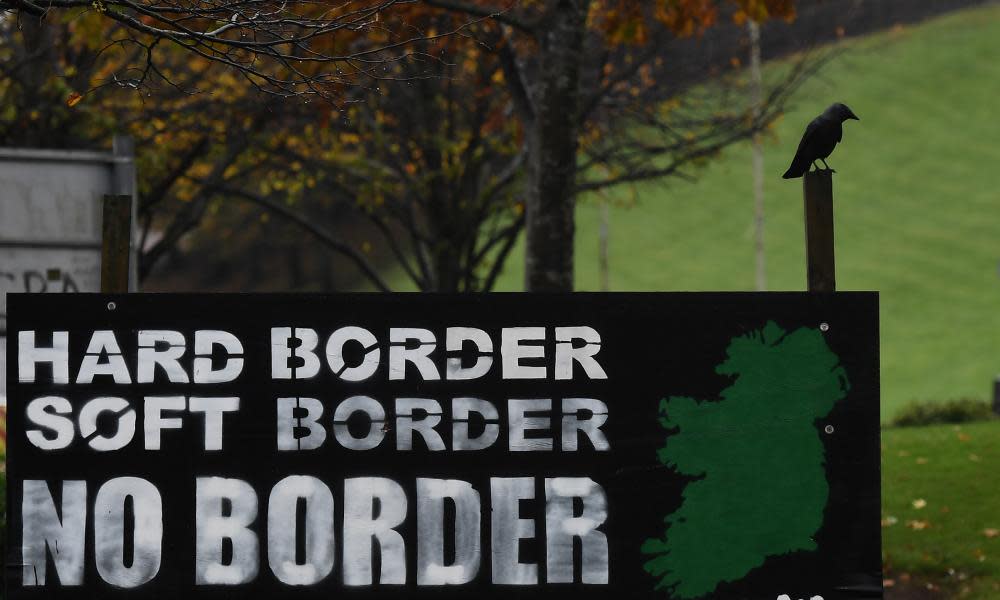DUP: EU Irish border claim is 'astonishing confidence trick'

The Democratic Unionist party has accused the EU of pulling an “astonishing confidence trick” on the UK government by claiming the Irish border problem is a roadblock to an overall Brexit deal.
The remarks by Sammy Wilson, the DUP MP for East Antrim, come just hours after the party, which is propping up Theresa May’s government, threatened to sabotage the Brexit negotiations by voting down her budget later this month. In a further warning shot across the government’s bows, the DUP abstained in a vote on the agriculture bill on Wednesday night.
Wilson said it was to “everyone’s amazement the government bought this con” perpetrated by the EU after it promised in writing that there would be no regulatory divergence between Northern Ireland and the rest of the UK.
Twenty-one bodies from the Northern Ireland business community have written to May voicing “grave concern” about a potential no-deal Brexit, calling for regional flexibility around migrant labour policies.
Writing in the unionist-leaning Belfast Newsletter, Wilson said: “They have concocted an outrageous confidence trick on the UK government claiming that the border presents an insurmountable problem to any trade between the UK and the EU after Britain leaves the EU.
“To everyone’s amazement the government bought this con even though the current trading arrangements across the Irish border showed that it was nonsense, and it took decisive action by Arlene Foster [the DUP leader] last December to get the agreement amended to put in safeguards to protect Northern Ireland’s position in the UK.”
His comments come as business leaders accused politicians including the DUP and the Northern Ireland secretary, Karen Bradley, of doing nothing to secure the region’s already weak economy in the face of Brexit.
They said Bradley’s recent speeches remarking on how well the economy was doing because unemployment figures were at record lows failed to take account of the realities: there were 300,000 people economically inactive in the region and the reason unemployment had dropped was because of the growth of people on income support.
Referring to May’s visit to Northern Ireland in July, Tina McKenzie, the chair of the Federation of Small Businesses Northern Ireland, said: “The narrative that the Fermanagh lakes are beautiful doesn’t work. We know they are; that’s why we live here. What we need is the secretary of state to give us a clear plan for Brexit.”
She said that regulatory checks would be an additional burden on business, but said a new regulatory regime was just an inevitable consequence of quitting the EU.
“We are tired of soundbites, hearing everything is rosy in the garden,” the business consultant Conor Houston told reporters at a press briefing on Thursday. “The rhetoric just gets louder the closer we get to a deal,” he said, adding this was of no use to businesses that were putting expansion plans on pausing, holding back the overall economy.
Seamus Leheny, the director of policy for the Freight Transport Association, said Northern Ireland was “disproportionately disadvantaged” by Brexit but pointed out that while there were 800,000 freight trips between Northern Ireland and Britain, there were 4.6m between Northern Ireland and the Republic of Ireland every year.
He said there would be “paralysis” on the border if there were checks, with the cost of delays put at £1 a minute per haulier.
Referring to the EU proposal to have checks on goods destined for Northern Ireland into British ports and premises instead of on the Irish border, Wilson said the EU was using “bully-boy tactics”.
He reiterated warnings by the DUP leader last week that the party would vote against any deal that involved what it considers would be a border in the Irish Sea.
He also accused the prime minister of going “totally against all the assurances” that “she would not allow Northern Ireland be treated differently from the rest of the UK”.

 Yahoo News
Yahoo News 
